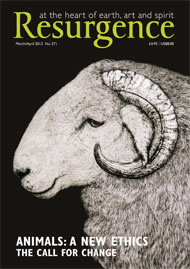As a young boy I was brought up to believe that animal behaviour is driven by ‘instinct’, an inherent characteristic that supposedly accounts for why animals behave the way they do. There is little doubt that this astonishingly arrogant tendency to view all non-human animals as essentially pre-programmed automatons has made it much easier to justify treating them in ways most of us would never consider treating our fellow humans.
Marc Bekoff and Jessica Pierce’s Wild Justice provides a convincing rebuttal to this all-too-prevalent conviction. Well researched (as a cognitive ethologist, Bekoff has spent many years studying animal behaviour), the book takes as its starting point Darwin’s assertion that the difference between humans and other animals is a matter of degree, not kind – the notion of evolutionary continuity. Darwin believed that any animal that possesses “well-marked social instincts” is capable of developing “a moral sense of conscience”.
Following on from this, the authors maintain that moral behaviour, consisting of fairness, cooperation and empathy, is a product of the evolutionary process, and is ‘hardwired’ into the physiology of a range of different species. As such it has evolved in much the same way as nervous systems, for example.
Throughout the 140 years since the publication of Darwin’s Descent of Man, discussion of the evolutionary process has focused on the physiological at the expense of the psychological – with very little serious consideration of the ability of non-human animals to empathise or distinguish between ‘right’ and ‘wrong’. Received wisdom presumes that these are uniquely human characteristics.
Bekoff and Pierce address this head-on, providing plenty of examples of moral behaviour in a range of different species, from rodents to elephants. In doing so, Wild Justice does not shy away from using the results of horrific vivisection experiments as evidence of morality. The authors argue that it would be foolish to ignore these results, but point out that the more such experiments uncover about the cognitive and emotional capacity of animals, the more problematic the research becomes.
Sceptics will inevitably cry “Anthropomorphism!” – ignoring the wealth of evidence that, at the very least, opens up the possibility that morality has evolved in a range of species. Bekoff and Pierce point out: “We’re not inserting something human into animals, but we’re identifying commonalities and then using human language to communicate what we observe.”
Of course we cannot be sure what goes on in the minds of other animals, but analysing behavioural characteristics is a sensible starting point. In fact Wild Justice goes further than focusing on ethological research, and draws upon an increasing body of work emerging from disciplines as diverse as neuroscience, philosophy and psychology.
Others will argue that there is insufficient evidence to support the assertion that a range of species are capable of moral behaviour. While it is acknowledged that there is much more work to be done, reliable assertions can still be made based on what we do know. In particular, readers are warned that philosophical objections are often disguised as scientific objections, and that care should be taken not to conflate the two.
Our understanding about how many species have the capacity for moral behaviour, and the variety of ways this manifests itself between species (as well as within species), may be in its infancy. However, both authors remain optimistic about some of the ethical implications of the emerging science. They argue that while increased understanding in this field doesn’t automatically lead to agreement on how we should treat animals, it may well lead to increased sensitivity to their needs. The ‘old logic’ often used to justify the way we treat animals is gradually giving way to a ‘new logic’ based on a recognition that many species have complex thoughts and rich emotional lives.
Wild Justice provides an extremely important contribution to the debate. And as traditional assumptions become increasingly threatened, let’s hope that Bekoff and Pierce’s conclusion about the emerging ‘new logic’ is correct, as the potential benefits for improved animal welfare are immense.






